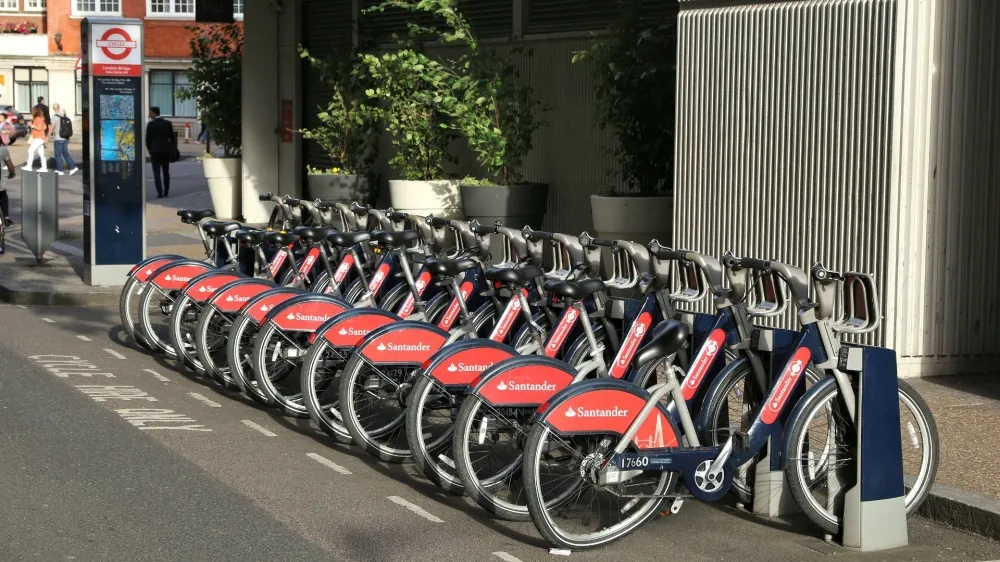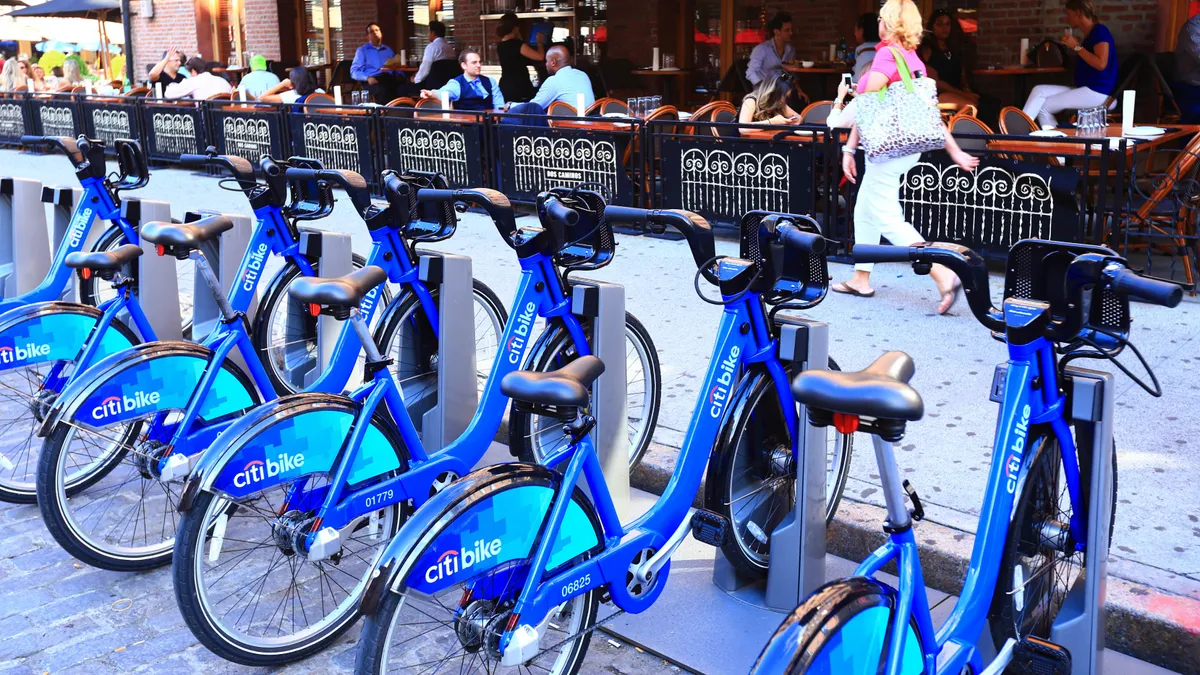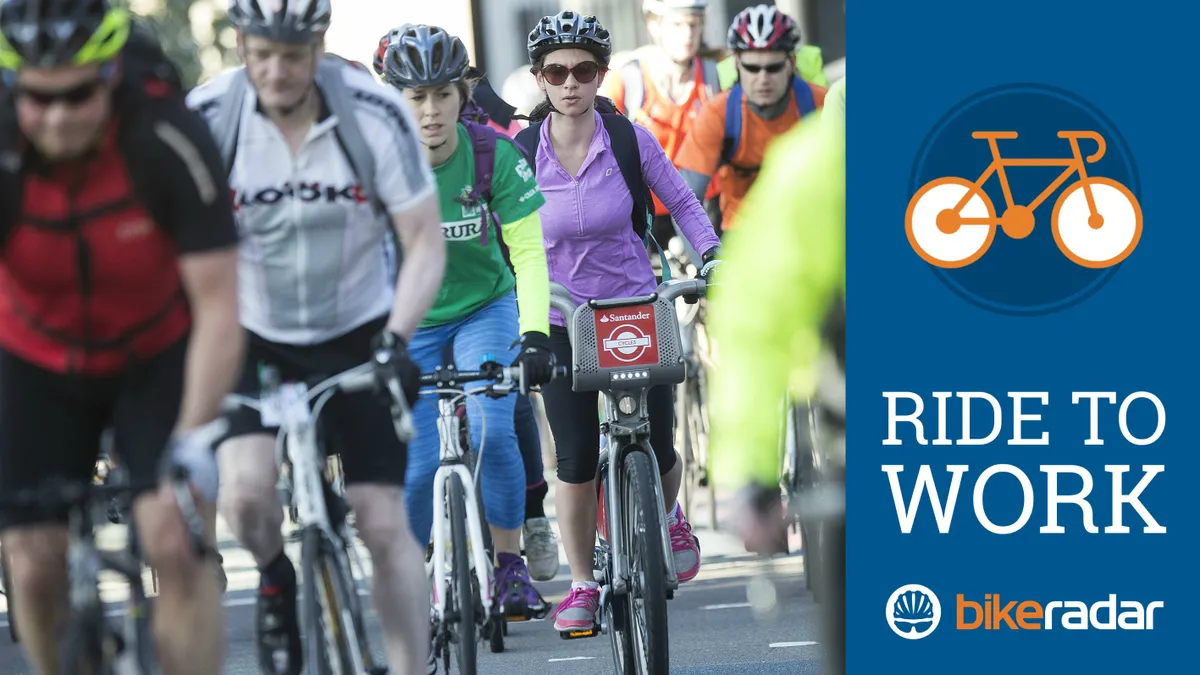Don't own a bike? Nowhere to store one at work? No room at home? If owning a bike is a logistical issue or you just want to dabble with bike commuting before diving in fully, then cycling hire schemes are well worth investigating.
- The best urban cycling clothing
- What's the best bike for cycle commuting
- Best waterproof jackets for cyclists
Cities and towns all around the world are launching public bike hire schemes, and they're perfect for commuters as well as tourists. You don't have to clean them, maintain them, or worry about locking them up somewhere safely, and you don't need to fork out a load of cash to buy a bike either; just pay as you go.
With most urban journeys being three miles or less, hire bikes are quicker than walking and often cheaper and more convenient than public transport — with the added benefit that they also mean you get some exercise too!.
Many will have hire stations around major transport hubs, so they are ideal for those with a multi-modal commute — that's anyone who gets the train into the city then either has to walk or get a second form of tranpsort to reach their final destination.
Many schemes will require the user to register or open an account, and almost all will require a credit or debit card to use.
The majority of schemes are based around a hub or docking station system, where bikes can be collected from and need to be returned. Some, particularly the newer ones, are entirely app based so you can find bikes and arrange rental using your smartphone.
We've collected a selection of the best city bike hire schemes around the world, as well as some hints and tips on how to get the best out of them when you're using them on your commute.

City cycle hire schemes around the world
Santander Cycles, London, UK
Used extensively by commuters and tourists alike, London's popular cycle hire scheme sees sturdy step-through frame bicycles located all across the UK's capital in docking stations.
Affectionately known as 'Boris bikes' after the eponymous Mayor of London who was in power when the scheme launched, they've also been named after various sponsors of the scheme, so you'll also here them called a Barclay's bike or, currently, Santander Cycles.
You don't need to register online for the scheme, but you do need a debit or credit card.
Each docking station has a pod where you pop in your card details and in return you'll get a code that you key in to release a bike.
You'll be charged a £2 access fee for a bike for 24 hours, with the first 30 minutes of each journey free. Given the number of docking stations in London it's actually pretty easy to get where you need to go in under 30 minutes, so you may not end up paying more than that flat access fee.
However, if you do ride for more than 30 minutes its £2 for every 30 minutes you ride.
A downloadable app will help you navigate a route and find an empty space to return your bike once you're done with it. It also allows you to get bike release codes without having to go to a station pod.
If you're a regularly commuter, you can pay £90 for a whole year's access. This is much cheaper than a London travel card or bus pass, so well worth considering if you think you'll use the scheme a lot.
- Cost: £2 to access a bike for 24 hours, first 30 minutes free, thereafter £2 per 30 minutes. £90 for a year's access.
- More info: Santander Cycles at Transport for London
Brompton bike hire, UK nationwide
The folding Bromptom bike is a very popular choice among commuters in the UK and worldwide due to their compact size and relatively light weight when folded, not to mention their zippy, city-friendly ride feel. However, they aren't the cheapest bikes out there and buying one is a bit of a financial commitment.
Luckily, the Brompton Bike Hire scheme is a handy solution to this problem. This dock-based hire scheme has locations at many UK train stations, including Bristol, Oxford, Manchester, Norwich and Canterbury.
Bikes are stored in a block of lockers outside the station, and once you've registered online with the website, you can then reserve a bike online or using the app and release it from the locker using the code you'll be sent.
Bikes are hired by the day, and you can return it to any public dock.
- Cost: £3.50 per day
- More info: bromptonbikehire.com
Capital Bikeshare, Washington DC
Named Capital Bikeshare, this is one of the largest city bike hire schemes in the USA and is regarded as one of the best.
Bike are located at rental stations across the city, which are powered by solar panels.
If you're looking for a bike, the Capital Bikeshare website and app will allow you to see the location of rental stations, how many bikes are present and also where empty docks are located so you can return the bike.
The bikes are resin colour, have three gears and like most cycle hire bikes have a front basket plus incorporated head and tail lights that activate automatically when the bike is being ridden.
To hire a bike you'll need a credit or debit card, which you use at the rental kiosk. Pop the card in, select the type of pass you'd like and the kiosk will give you a code which you use to release the bike from the docking station. You can rent two bikes at a time.
A red light on the station denotes that the bike is out of order so avoid those, and if you notice the bike you are on is malfunctioning, the 'repair' button on the dock will alert the scheme managers to the issue.
Capital Bikeshare also operates in a number of other US cities and towns, including Arlington, Virginia, and Montgomery County and Maryland.
- Cost: $2 for a 30 minute ride, $8 for 24-hour access, and $85 per year for full access.
- More info: capitalbikeshare.com
Citi Bike, New York City
Citi Bike is the largest city bike hire scheme in the US, with over 10,000 bikes at 603 hire stations — and plans to increase this to 12,000 bikes and add a further 375 docking stations by the end of 2017.

When it launched in 2013 it was instantly very popular, with 70,000 people registering to use the scheme in the first three months alone. The company uses the enticing strapline 'faster than walking, cheaper than a taxi and more fun than the subway.'
The system works in a similar fashion to both the London and Washington-based schemes. Bikes are located at docking stations across the city, including Manhattan, Queens, Brooklyn and Jersey City, you'll need a credit or debit card to rent a bike, and up to four bikes can be rented on one card at a time.
If the bike isn't returned after the 30 minute ride period, a charge of $4 for every subsequent 15 minutes of use is applied.
- Cost: $12 for unlimited 30 minute rides in a 24 hour period, $24 for unlimited 30 minute rides in a three day period, $163 for an annual pass which gives unlimited 45-minute rides over the year.
- More info: citibikenyc.com
Hubway, Boston, Massachussets
Launched in 2011, the Hubway cycle hire scheme in Boston may be one of the smaller schemes in the US but it's still a very popular one. It has 1,600 bikes located at stations across Boston, Brookline, Cambridge and Somerville.
To use the scheme, you can become a member online or use a credit or debit card to release a bike from a docking station.
As with other hire schemes, a website and app will help you locate where stations are located, the number of bikes at the station and where there are empty docks to return your bike.
All the usage options have the first 30 minutes of each ride included, with extra usage charges kicking in after that. For the 24-hour and 72-hour rental options, these are $3 for each additional 30 minute period. For the monthly and annual access plans these are $1.50 for an additional 30 minutes, then $3 for 61 to 90 minutes, then $6 per every 30 minute period on a ride of over 91 minutes in duration.
- Cost: $8 for unlimited 24 hour access on rides 30 minutes or less, $20 for unlimited monthly access, $99 dollars for unlimited year-long access.
- More info: thehubway.com
Melbourne Bike Share, Melbourne, Australia
Melbourne Bike Share is one of only a few cycle hire schemes in Australia, and in general hire schemes haven't fared so well there partly due to the compulsory helmet laws. However, Melbourne Bike Share has overcome this by providing helmets free of charge for use with each bike, and also offering AU$5 helmets at vending machines and various retailers across the city.
As with other hire schemes, the included usage period is restricted to 30 minute journeys (45 minute on the annual membership), although you can have as many as you like within the hire period. Go over the 30 minutes and it's an additional AU$2 for up to a 60 minute trip, AU$7 for up to a 90 minute trip, and AU$10 for every 30 minute period after that. Docking stations locations are concentrated around the centre of Melbourne.
You'll also be charged an AU$50 security deposit on your card, which will be held for an average of three to 10 days to ensure the safe return of the bikes.
- Cost: AU$3 for unlimited 30 minute trips within a 24 hour period, AU$8 for unlimited 30 minute trips within a week-long period, AU$60 for unlimited 45 minute trips over the course of one year.
- More info: melbournebikeshare.com.au
Top tips for using a city bike hire scheme to commute
- Plan your route in advance, and time it, so you'll be able to accurately work out how much time you'll need to get from A to B. Don't forget to factor in time to find and release a bike!
- Also plan a back-up route, just in case your regular way is blocked. This is a particularly good idea if you ride in traffic-prone areas.
- If you want to bring a helmet to use — and helmets are compulsory for cycling in certain parts of the world — then opt for a bag that has a way of attaching a helmet to it like those made by Osprey. An elesticated strap hooks through the ventilation holes, so your helmet doesn't dangle and bang against things when hanging off your bag and doesn't take up room inside it.
- Another alternative is a folding helmet. Cycling accessories brand Brooks has produced the JB Classic Folding Helmet and there is also one by Morpher and another by Overade called the Plixi.
- Invest in a good quality waterproof jacket. You may only be riding for a short while, but getting wet on your way to work is not fun!
- Get clothes that are both smart for work and comfortable for cycling in. Gear like Merino T-shirts and jeans with some stretch in them are ideal, particularly if your work has a smart/casual dress code. There's also more urban cycling gear available than ever before, if you want something a little more cycling specific.
- A good rucksack or messenger bag is ideal for carrying your day-to-day bits and pieces such as laptops, phones, notebooks etc. Make sure it's comfortable and stays in place — you don't want it swinging round and knocking you off balance as you ride.
- Leave a few items at work if you can so you can freshen up and smarten up when you get there. A hairbrush, wet wipes, deodorant and a spare pair of socks are recommended by consummate bike hire commuters.
- Sponsored: UK readers — can you go the extra mile this summer? By running or cycling to work you can be a part of Red Bull’s UK-wide Million Mile Commute. Join the club in Strava to be eligible for a Red Bull sample kit to set you on your way. Don’t forget to share your commutes by tagging @RedBullUk and use #MillionMileCommute

